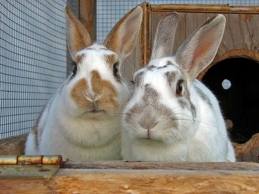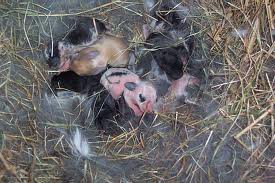It happened almost overnight: your cute, well-mannered little rabbit reached puberty.
Suddenly, your baby has become unmanageable. He has taken an unexpected ‘interest’ in your ankles. The circling and honking are certainly very cute, but the nipping and mounting must stop. And, he has seemingly forgotten why you’ve provided him with a litterbox.
Sound familiar? Read on to find out what you can do to help your rabbit return to his sweet,
well-mannered self.
Behavioural Benefits
Upon reaching sexual maturity (at 3-4 months for small breeds and 4-6 months for larger breeds), a rabbit’s behaviour becomes largely driven by his or her hormones. While the courtship behaviour (honking and circling) exhibited by an unaltered rabbit IS cute and endearing, most of the changes your rabbit will go through after reaching sexual maturity are considered to be unacceptable. For example:
- Your rabbit may start spraying urine to mark territory. Even female rabbits may do this. If you have ever been the object of your rabbit’s affections and been ‘marked’ with urine, you know that it is not a pleasant gift. In addition, high hormone levels of unaltered rabbits give their urine a foul odour.
- Your previously litter-trained rabbit may suddenly stop using his litterbox. The urge to mark territory can be overwhelming for an unaltered rabbit. In addition to spraying, your rabbit may start to drop feces around his area to mark territory.
- Your previously cute, cuddly rabbit may suddenly become aggressive. Females may become especially ‘nest’ or ‘cage’ protective and start lunging, nipping, boxing and growling.
- Chewing and digging activities may become intensified. Note that chewing and digging are normal rabbit behaviours, but these activities become intensified in unaltered rabbits.
- Your rabbit may start incessantly mounting things such as other pets, your legs, your feet, etc. Rabbits – especially males – may become increasingly interested in family members, other pets or inanimate objects in a new, sexual way. Some females will mount, too.
- Your rabbit may start honking and circling the object of his or her affections. Honking and circling are rabbit courtship behaviours. Some rabbits continue to honk and circle even after being altered.
- Same-sex siblings or other previously bonded pals may start to fight to establish dominance. Changes in behaviour associated with sexual maturity affect your unaltered rabbit’s ability to keep friendships or make new ones. Altered rabbits of the same sex are much more likely to live in harmony than their unaltered counterparts.
We know that spaying and neutering deters, if not eliminates, most negative behaviours associated with sexual maturity within 3 months. It is unfair to surrender your rabbit to a shelter or to an outdoor or basement hutch because he or she has become a hormonally-charged nuisance. Have your pet spayed or neutered and give him a chance to remain an important member of your family.
Health Benefits
Unspayed female rabbits have a very high chance of developing uterine, mammary or ovarian cancer during their lives. Unofficial statistics indicate that between 50% to 80% of all unspayed females will be affected by cancer, by age 5. The incidence of testicular cancer in unneutered males is much lower, but does occur. By contrast, spay and neuter surgeries, IF performed by a rabbit savvy veterinarian, carry very little risk (success rates are close to 100%). For more information, see the section of this web site on finding a rabbit savvy veterinarian.
Female rabbits do not come into heat in the same way dogs do. They are able to become pregnant at any time. Rabbits can have a litter every 31 DAYS. The female can get pregnant within 24 hours after giving birth if not separated from an male. Male rabbits are still fertile up to a month after being neutered and should remain separated from unaltered female rabbits during this time.
Often people will decide to get two litter mates, supposedly of the same sex, so that their new pet will have company. However, it is extremely difficult to accurately determine the gender of young rabbits until the males testicles decend at 14 weeks. Many times the unsuspecting owners will actually have two rabbits of the opposite sex. Within months they will experience a population explosion.
You should only trust an experienced rabbit vet to assess the gender of young rabbits. But, there are times when even they have difficulty until the rabbit is older. The best way to ensure that unwanted litters don’t occur is to NEVER introduce two unaltered rabbits, no matter what the age. Baby rabbits need to stay with their mother until they are weened at 8 weeks old.
Cute little babies may look small but some breeds are able to conceive by 12 weeks old. All siblings should be separated from one another after they have been weened and until they have been accurately sexed and spayed or neutered. Leaving “baby” siblings together, or trying to separate all the girls from the boys is a mistake that many people make. It only takes one wrongly sexed rabbit to create a number of new litters. DO NOT take this chance.
Finding homes for unwanted litters is not an easy task, and often leads to more rabbits being surrendered to shelters. For every litter that is produced, a number of shelter rabbits are euthanized because there are simply more rabbits in need of homes than there are homes willing to adopt them.
A Final Note
If your rabbit is not spayed or neutered, please consider having this important surgery performed on your pet. Your rabbit will not become fat and lazy or lose his personality after the surgery. In fact, your bunny will be happier and healthier for it. You will responsibly be able to allow your rabbit to be introduced to another rabbit for companionship. And furthermore, you will be indirectly saving the lives of shelter rabbits by not contributing to the domestic rabbit overpopulation problem.
Read More:
Why Spay or Neuter my rabbit? Some Scary Numbers… by Dana Krempels, Ph.D.


